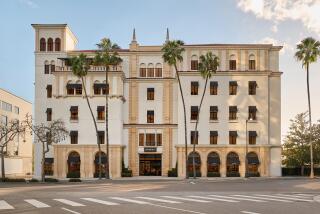Fleetwood, Sam’s Club Reach Deal
With sales slipping sharply, Riverside-based Fleetwood Enterprises Inc. hopes to boost its manufactured-home business by selling units at Sam’s Club discount stores in nine states.
The partnership creates a potentially lucrative marketing platform for Fleetwood and marks a bold step by Wal-Mart Stores Inc., parent company of Sam, to move into yet another market.
“If there’s a product that Americans buy, Wal-Mart wants its fair share of that category,” said Shelly Hale, an analyst with Banc of America Securities.
Wal-Mart, with expected sales of $30 billion this year, has continually expanded its product line with more expensive products, but selling homes is unprecedented, she said.
“You can only take it seriously because it’s Wal-Mart,” Hale said.
In a pilot program, Fleetwood began selling manufactured homes from kiosks at 22 Sam’s Club stores in January. Last month, Fleetwood and Wal-Mart agreed to expand the sales to include a total of 117 Sam’s Club stores in nine states--or a quarter of all its locations. None of the stores currently targeted for home sales is in California.
Under the deal, Sam’s Club provides Fleetwood with store space for sales kiosks at no cost. Sam’s Club gets a commission on each sale.
No homes are displayed in the stores. Instead, sales representatives are on hand to take orders or offer brochures and information.
Fleetwood, the largest U.S. maker of recreational vehicles, said Friday that preliminary sales for its fiscal first quarter ended July 29 are down 22% from the year-earlier period, to $562 million. The company said it expects to post a loss when it reports earnings in four weeks.
The company makes both recreational vehicles and manufactured homes. RV sales dropped 17% to $265 million, and manufactured housing fell 27% to $288 million, Fleetwood said.
Experts said the two sectors are suffering for different reasons.
RV sales, which are closely linked to consumer confidence, have sunk with the slowing economy. Meanwhile, manufactured homes are hurting from what one analyst called “industry mismanagement” in the late 1990s. Companies expanded plants and stockpiled inventory while selling homes to buyers with shaky credit ratings. Many home buyers defaulted on their loans, creating a used-home market that has siphoned off demand for new homes.
Lenders have since implemented more stringent underwriting standards--which have further hurt sales, said Michael Crawford, an analyst with B. Riley & Co.
But the deal with Sam’s Club could help reverse the downward trend by reaching bargain-minded shoppers looking for a good deal in housing.
“Typically, the shopper at a discount club is going to fit in with the profile of the people who would buy a manufactured home,” said Mike Jaffe, an analyst with Standard & Poor’s.
Manufactured homes, noted Lyle Larkin, vice president and treasurer for Fleetwood, cost half as much per square foot as traditional homes.
“It’s just a way of expanding the potential market and reaching customers we may not otherwise have contact with,” he said.
In 1999, 21.4 million people, about 7.6% of the U.S. population, lived in manufactured housing, according to the Manufactured Housing Institute, a trade group.
Despite slumping sales, Fleetwood’s stock has climbed 39.5% in the last three months. The stock rose 60 cents on Friday to close at $16.80 on the New York Stock Exchange.
Investors now sense that the worst of Fleetwood’s problems are behind it, according to analysts.
“Most people feel like the bottom, if it hasn’t been reached, is very near,” Jaffe said.
More to Read
Inside the business of entertainment
The Wide Shot brings you news, analysis and insights on everything from streaming wars to production — and what it all means for the future.
You may occasionally receive promotional content from the Los Angeles Times.









